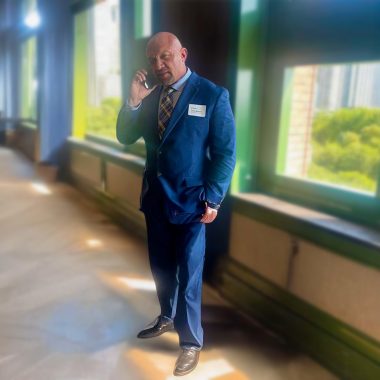Government contracting for veteran employment presents unique challenges that require both strategic networking and deep understanding of bureaucratic processes. Former British Army officer Hugh Andree has spent over two decades navigating these complex B2G relationships, building bridges between military talent and government opportunities. His journey from military service to executive recruitment has provided valuable insights into what works and what doesn’t when pursuing government partnerships for veteran hiring initiatives.
Transitioning from Service to Strategy
Hugh’s path into B2G relationships began with his military background and evolved through executive recruitment. “I served as an officer in the British Army. I left at the end of the 90s and I fell into recruitment and staffing, where I started off cutting my teeth, recruiting people in finance and moving up to effectively C suite recruitment,” he explains. This foundation in executive search, often called headhunting, became the cornerstone of his approach to government partnerships. The key to his success lies in understanding people and their career trajectories. “In business, I often say it’s not what you know and it’s not who you know, but it’s what you know about who you know that really matters,” he notes. Those individuals he placed into employment 25 years ago have since moved into senior positions, creating a valuable network that spans military, business, and government sectors.
The Art of Listening in Government Relations
Hugh credits his military training at Sandhurst for teaching him one of the most crucial skills in B2G relationships. “I was taught from a very young age as a young officer, listen to your platoon sergeant, listen to your corporals, listen to private soldiers, because at the start they’ve all got more experience than you,” he shares. This listening approach translated directly into his business success, particularly when working with international clients.
He describes a recent project with an overseas air force purchasing Typhoon Euro fighters. “They were buying a dozen Typhoon Euro fighters, which was easy to do because they had lots of money, but actually once you’ve received your Euro fighter, you have to maintain it, repair it, sometimes there are overhauls, and the problem they had is they didn’t have the people with the necessary skills,” Hugh explains. Understanding these specific needs allowed him to position veteran talent as the solution.
Overcoming Small Business Barriers
Government contracting presents significant challenges for smaller companies, something Hugh learned firsthand. “I lost a government contract a few years ago. They wanted me to provide 20 female ex British military instructors to go to Saudi Arabia. I had all the people, I had the knowledge and experience of what they were going to train, but I’d never written a submission through a government contract,” he recalls. The bureaucratic requirements can be overwhelming, especially for entrepreneurs with other responsibilities. “It costs money. Most government contracts in my experience can take between six to 12 months,” he points out. For a BAE Systems contract in Saudi Arabia, he calculated spending £75,000 just to become approved, demonstrating how capital requirements can exclude capable small businesses from government opportunities.
Three Steps to Breaking into Government Contracts
Hugh outlines a clear approach for companies seeking government partnerships.
Listen First, Sell Second
Hugh learned early that the best salespeople are listeners, not talkers. “Sales people, on the whole, aren’t very good listeners, actually the best sales people, the ones who can listen,” he explains. Before pitching anything, spend time understanding their actual problems. That overseas air force didn’t need sales talk about jet fighters – they needed people who could maintain them. Listen for the real challenge behind their stated requirements.
Pick Your Battles Wisely
Not every government contract is worth pursuing. His strategy is simple: understand if there’s genuine need, know your competition, and only fight battles you can win. “There’s no point picking fights that you’re going to lose,” he notes. Small businesses especially can’t afford to waste six months and thousands of pounds on impossible contracts. Research thoroughly, assess your chances honestly, and focus resources on opportunities where you have real advantages.
Build Networks Before You Need Them
Hugh’s success comes from relationships built over decades. Those finance professionals he placed 25 years ago are now in senior positions, remembering who helped them. “It’s not what you know and it’s not who you know, but it’s what you know about who you know that really matters,” he emphasizes. Start networking now across military, business, and social circles. Government contracts often come through introductions, not cold applications.
Hugh sees AI transforming how veteran recruitment works. His company built an AI bot that can handle first-round interviews. Those initial conversations are mostly yes or no questions anyway. Do you have an HGV license? Will you work in Sheffield? Can you accept this salary? “I can interview a thousand people all at one time,” he says. The bot even provides feedback to rejected candidates, something that rarely happens with human recruiters. “You never hear anything and you’re left wondering what happened,” Hugh notes about the typical experience. He stays optimistic about change. “Once upon a time, you owned a horse and then suddenly something with four wheels came along. You just have to move with the times, you evolve with it.” His philosophy is straightforward: “Be kind, be curious and be brave. That is what I want to have on my headstone.”
Follow Hugh Andree on LinkedIn to learn how veteran hiring and government contracts can align for real, scalable impact.
If you want to access veterans, their spouses or family members from a UK community of 5.1million, or supply services and products please contact weserved.com for further information.








